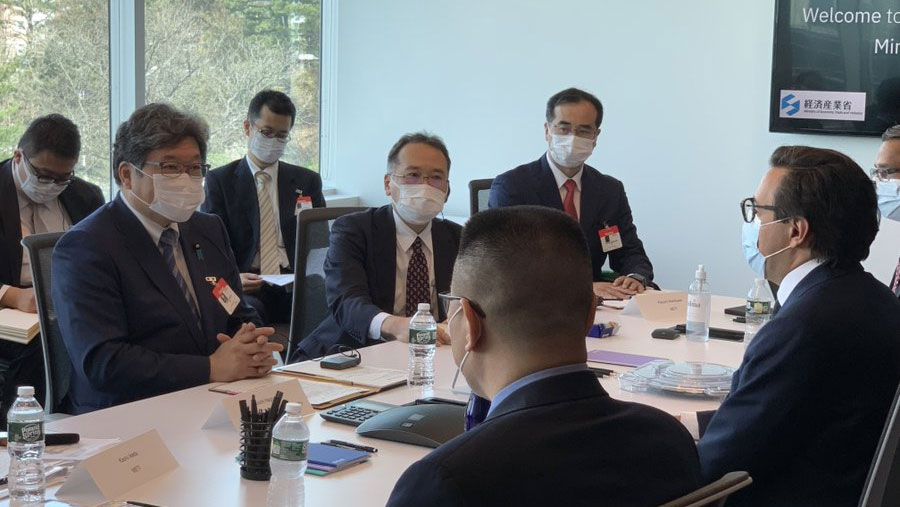US and Japan Cooperate on 2nm Chip Development
Part of the reason is to secure semiconductor secrets from China.
Japan and the United States have agreed to close cooperation to advance 2nm semiconductor process development and mass production. A report published by the Nikkei financial newspaper says that Japan's Koichi Hagiuda, Minister of Economy, Trade, and Industry, arrived in the United States on Monday for talks regarding this collaborative effort.
The idea of the two governments is to build a state-of-the-art semiconductor supply chain that is very secure against leaks to China and leverage the respective technological strengths of the two nations involved.
As a Japanese publication, the Nikkei was much more detailed on what Japan had to offer to the partnership. It suggests Japan has strengths in important semiconductor technologies such as silicon wafer manufacture, photosensitive agents manufacture, and abrasives for semiconductor surface preparation and building some key semiconductor manufacturing equipment. Some Japanese organizations which may be involved in the collaboration include Tokyo Electron, Canon, and the National Institute of Advanced Industrial Science and Technology.
It isn't clear what technologies and commercial entities will be involved on the US side, but it looks likely to be IBM and Intel.
There are a couple of key reasons for the new Japan-US technology pact. The first is technology leaks to China. The Taiwanese government has pushed hard against Chinese industrial espionage. However, quashing tech secret leaks from Taiwan to China looks like a high-stakes game of whack-a-mole, which is hard to maintain. Japan and the US might also suffer from similar espionage attempts. Still, Taiwan's proximity to China, and the fact that a segment of the population identifies as Chinese or part-Chinese, doesn't help with security. There is also the question of geopolitical stability, with the Chinese communist party regularly saber-rattling and making statements about using military force to absorb democratic Taiwan.
Another reason for the Japan-US pact is that Taiwan's TSMC won't build a cutting-edge foundry off the island. It wants to keep the crown jewels production technology on its home turf. TSMC's much-welcomed foundry plans in the US and Japan are expected to be limited to 10-20nm chip production. Meanwhile, TSMC expects to deliver Made-in-Taiwan 2nm products to its customers in 2026.
Japan's participation in the global semiconductor market has shrunk alarmingly since 1990, when it supplied about half of the market with all manner of chips. In 2022 its market share will be nearer to 10%.
Get Tom's Hardware's best news and in-depth reviews, straight to your inbox.

Mark Tyson is a news editor at Tom's Hardware. He enjoys covering the full breadth of PC tech; from business and semiconductor design to products approaching the edge of reason.
-
Integr8d “Another reason for the Japan-US pact is that Taiwan's TSMC won't build a cutting-edge foundry off the island.” The crux of the matter...Reply
How do we offer to transplant the segment of the population that identifies as Taiwanese and the high technology to the US? If China wants an island so bad, let them have it. We would happily take the people, who are the true gems of the island, and some 2nm goodness:) -
cryoburner Reply
I imagine most people are probably not going to want to leave their homes and move halfway around the world to a different country with different culture. They undoubtedly want to keep their country under their control if at all possible, and probably feel that keeping their cutting-edge semiconductor production local will encourage the international community to support them should China try to make a move.Integr8d said:“Another reason for the Japan-US pact is that Taiwan's TSMC won't build a cutting-edge foundry off the island.” The crux of the matter...
How do we offer to transplant the segment of the population that identifies as Taiwanese and the high technology to the US? If China wants an island so bad, let them have it. We would happily take the people, who are the true gems of the island, and some 2nm goodness:) -
Co BIY A major factor in Taiwan's success is it's deep, often personal and family, enmeshment with the Chinese mainland. It has succeed on such an amazing scale because it is free but also because it has had huge advantages in maximizing access to Chinese production, labor and markets.Reply
The CCP has encouraged and required deepening that enmeshment and integration at an even deeper level for Taiwanese firms than that required of Western firms.
During the early history of the development of Taiwan they considered mainland China their lost territory. Many still see it primarily that way and consider themselves Chinese upholding a tradition usurped and destroyed by the CCP.
Over 1 Million Taiwanese citizen's/resident's live and work on the mainland often as managers and coordinators of joint ventures and partnership.
I think that this is what drives the CCP to the extremes. The Taiwanese example of Chinese Freedom and success without CCP "Leadership and Guidance" is very close and very visible to the people. It undermines their primary ruling justification that only the CCP could have brought about the growth China has experienced and that more than justifies all the repression, cruelty and corruption. -
cristovao If this people went to US they might get shot and killed in any trafic stop just for not being Americans!Reply
I mean this people feel safer in their homeland for sure!
